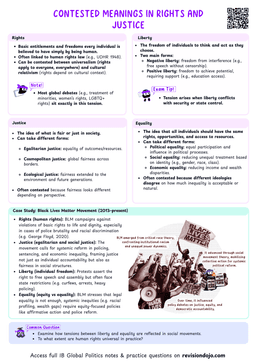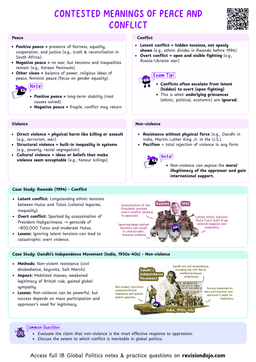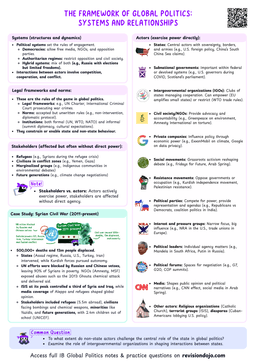The State
Global politics involves a wide range of actors and stakeholders, but the state is often the most powerful of them all.
- Understanding the state, how it functions internally and interacts with other states, is a key part of studying global politics.
What is a ‘state’? Our modern concept of the state is shaped by two key agreements:
| Treaty of Westphalia (1648) | Montevideo Convention (1933) |
|---|---|
| Ended the Thirty Years' War in Europe, one of the most destructive conflicts in history. Named after the Westphalia region in northwest Germany. Recognized the rights and responsibilities of states to reduce future conflicts. | Agreement signed in Montevideo, Uruguay. Defined the modern state as a way to promote peace. Stated that no state should interfere in another state’s domestic or foreign matters. |
- Understanding power in global politics through the lens of human behaviour and interactions.
Characteristics of a state (based on both agreements):
- An independent government with authority over a clearly defined territory (with internationally recognized borders).
- Seen as having full control over its own land and people.
- Has the right to defend itself and be acknowledged as a state by others.
- Operates with a system of government, which can be national, regional, or local, and usually includes a legal framework.
- A permanent population
- Exclusive rights within its territory, such as:
- The use of force
- Control over currency and the economy
- The ability to create and enforce laws, including tax systems and citizenship rules
What is a ‘nation state’?
- There’s a key difference between a state and a nation state.
- A nation refers to an ethnic or cultural group with a shared identity or culture.
- A nation state is when this group also has its own territory and government, but not all nations do.
- In today’s interconnected world, true nation states are relatively rare.
- Examples include Japan, Albania, and Iceland, where the population is largely unified by culture and governed by one state.
- However, many nations exist without a state. These groups are often spread across different regions or countries, living outside their ancestral homeland. This is known as being in the diaspora, when people are living away from their cultural homeland, sometimes by choice, but often due to displacement.
- Examples of stateless nations include:
- The Kurdish people
- The Rohingya
- The Roma (Romani) people
- How do we determine what is a state and what is not?
- For much of history, states have been the most powerful actors in global politics. They control national interests and play key roles in international decision-making.
- Even though the role of states is now being questioned, with more actors influencing politics, states still remain central.
- They continue to shape laws, borders, and the lives of their people.
- Today, we recognize that global politics involves more than just states. While other actors now play major roles, states are still among the most powerful and influential forces in the world.
The Republic of Molossia (United States)
- Background: Founded in 1977 by Kevin Baugh, Molossia is a self-declared micronation located on Baugh’s private property near Dayton, Nevada, USA.
- Government: Baugh styles himself as the President of Molossia.
- Features of a State:
- Has its own constitution, national anthem, flag, currency (the Valora), and "military".
- Claims to be at war with East Germany, despite its dissolution in 1990, a running satirical joke.
- Offers passports and citizenship (symbolic, not legally valid).
- Recognition:
- Not recognized by any official government.
- Considered a micronation or political satire rather than a real country.
- The U.S. government treats it as private property.
Different Systems of Governance
- There are many different political systems and ways of organizing societies.
- One common way to represent these systems is by placing them on a political spectrum, which often runs from left-wing to right-wing.
- This spectrum helps us understand where different ideologies fall in terms of economic policies, social values, and views on power.
Left Wing
- Far Left - Communism: Argues that inequality comes from capitalism. All people should have equal access to resources, and private ownership is abolished.
- Left - Socialism: Supports fairer wealth distribution and reducing inequality, but can still exist within a capitalist system.
- Centre-Left - Social Democracy: Believes in using government policies (like welfare and healthcare) to reduce inequality while keeping capitalism.
Centre
- Liberalism: Focuses on individual rights, freedom, and equality under the law. Believes states and individuals both have roles in creating a fair society.
Right Wing
- Centre-Right - Conservatism: Emphasizes tradition, religion, and social stability. Individuals should take responsibility for themselves with limited state interference.
- Right - Nationalism: Prioritizes loyalty to the nation-state. National identity is central, sometimes promoting superiority over others.
- Far Right - Fascism: Extreme nationalism mixed with authoritarianism. Power is centralized in a leader, dissent is crushed, and other groups may be targeted or excluded.
- These categories are simplifications.
- In reality, many political systems are more complex and don’t always fit neatly into this spectrum.
- Still, understanding these terms helps make sense of global political debates.
Political Parties
Political Parties
Political parties are groups of people who share ideas about how a country should be governed. Their main goal is to gain and hold political power.
- In a strong democracy, even political parties that aren’t in power can question or challenge the ruling party’s decisions, this keeps the system accountable.
- While political parties are commonly linked to democracies and elections, they exist in all political systems, including authoritarian regimes.
- For example, China and North Korea have only one legal political party, while countries like the United States allow multiple parties to compete in elections.
- China: Chinese Communist Party (CCP)
- The only legal political party in China; it controls all levels of government.
- India: Bharatiya Janata Party (BJP)
- One of India’s two major political parties, alongside the Indian National Congress.
- Russia: United Russia
- The dominant party in Russia; has held and consolidated power since 2007.
- North Korea: Workers’ Party of Korea
- The only legal political party; total control is held by the ruling family and party.
- Singapore: People’s Action Party (PAP)
- Has governed since 1965; the most powerful political force in the country.
- United States: Democratic Party
- One of the two major parties, the other being the Republican Party.
- Argentina: Justicialist Party
- A long-standing party that has been in and out of power since 1946.
- South Africa: African National Congress (ANC)
- Has been the ruling party since the end of apartheid in 1994.
- Can democracy exist without political parties? Why or why not?


